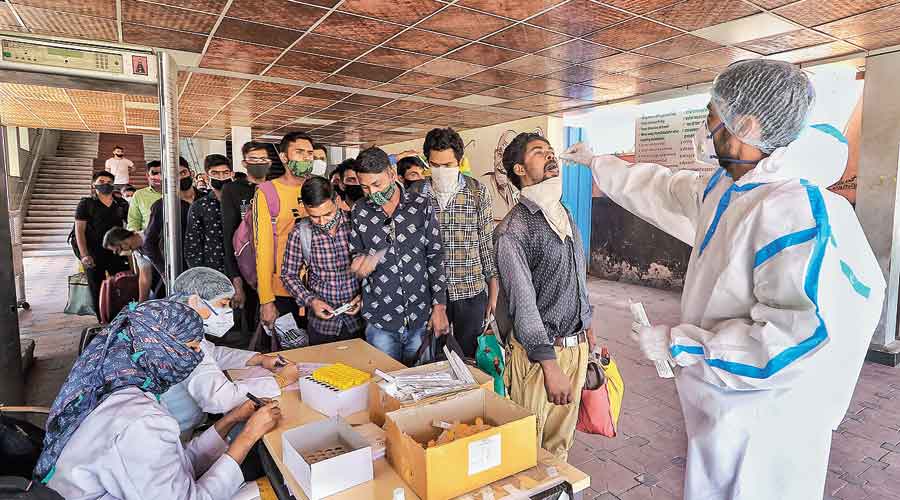
Dearth of samples and funds delay India’s plans to sequence 5% of coronavirus genomes
Labs using capital borrowed from other projects have sequenced around 11,000 genomes instead of over 50,000

A 10-lab consortium of government labs tasked with sequencing five per cent of coronavirus genomes from across India is awaiting dedicated funds nearly three months after the Centre announced the initiative late-December citing concerns about a fast-spreading UK variant.
The absence of assigned funds and the arrival of fewer sequences from various states than ideally required have limited sequencing efforts, senior researchers with the Indian National SARS-CoV-2 Genomics Consortium have told The Telegraph.
The labs using funds borrowed from other projects have sequenced around 11,000 genomes instead of over 50,000 required to meet the sequencing goal of five per cent of over a million new Covid-19 cases in India since January 15.
The number of samples, however, that have come in for sequencing also do not match the five per cent target. The consortium had until mid-March received 19,092 samples from across the country instead of over 50,000 it should have received.
The consortium should have ideally sequenced over 17,000 genomes from Maharashtra alone where Covid-19 counts increased by over 354,000 since mid-February. But it had until mid-March received only 2,826 samples from Maharashtra.
The sequencing is intended to help in early detection of unusual variants with mutations that might impact the epidemic’s patterns. But the fewer the samples, the harder it is to draw statistically valid, meaningful inferences about the variants observed in the samples.
“We’ve lost over two months,” a senior researcher told this newspaper. “Without funds, we can’t recruit the human resources or get the reagents for large-scale sequencing. If the money appears this week, it’ll take time to hire and purchase which will likely delay full capacity sequencing even further.”
The Centre had on December 30 announced INSACOG, a joint initiative by the Union health and science ministries coordinated by the department of biotechnology (DBT), amid growing concerns worldwide about fast-spreading variants in the UK and South Africa.
The consortium — 10 government labs across India, each assigned specific regions — is designed to both bolster sequencing and pair the sequencing data with epidemiological data to allow health researchers to look for patterns, if any, between mutations and local outbreaks.
But INSACOG has received no funds yet, researchers and officials have told this newspaper.
A senior official with the DBT, the agency expected to support the initiative, told The Telegraph on March 8 that “budget issues have been handled” and the institutions have been asked to proceed with funds available with them. “Additional funds are also being made available,” the official said.
The consortium’s researchers had initially sought around Rs 120 crore, but revised it downward to Rs 90 crore, hoping it would aid speedier approval. “We’re waiting, hoping it will arrive this week,” the director of one of the labs told this newspaper on Thursday.
The nearly 11,000 genomes sequenced since January represent “an extraordinary effort” by members of the consortium working without assigned funds, said a senior official. This is nearly double the 6,000-plus sequences done by different Indian labs in the nine months prior to INSACOG.
Most of these INSACOG genomes were sequenced by the National Centre for Disease Control, New Delhi, the nodal lab for the consortium, the Institute of Genomics and Integrative Biology, New Delhi, and the Centre for Cellular and Molecular Biology, Hyderabad.

0 Response to " Dearth of samples and funds delay India’s plans to sequence 5% of coronavirus genomes"
Post a Comment
Disclaimer Note:
The views expressed in the articles published here are solely those of the author and do not necessarily reflect the official policy, position, or perspective of Kalimpong News or KalimNews. Kalimpong News and KalimNews disclaim all liability for the published or posted articles, news, and information and assume no responsibility for the accuracy or validity of the content.
Kalimpong News is a non-profit online news platform managed by KalimNews and operated under the Kalimpong Press Club.
Comment Policy:
We encourage respectful and constructive discussions. Please ensure decency while commenting and register with your email ID to participate.
Note: only a member of this blog may post a comment.